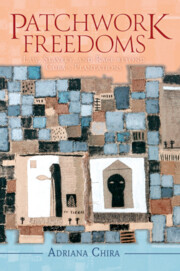Book contents
- Patchwork Freedoms
- Afro-Latin America
- Patchwork Freedoms
- Copyright page
- Dedication
- Contents
- Figures
- Maps
- Tables
- Acknowledgments
- Manuscript Sources and Abbreviations
- Note on Language and Region
- Maps
- Introduction
- 1 Unenclosed People, Unenclosed Lands
- 2 Foreign Implants
- 3 Keeping People Put
- 4 Manumission’s Legalities
- 5 “A Freedom with Further Bonds”
- 6 “Para levantar los negros y proclamar la República”
- Conclusion
- Book part
- Bibliography
- Index
1 - Unenclosed People, Unenclosed Lands
Santiago de Cuba to 1800
Published online by Cambridge University Press: 10 February 2022
- Patchwork Freedoms
- Afro-Latin America
- Patchwork Freedoms
- Copyright page
- Dedication
- Contents
- Figures
- Maps
- Tables
- Acknowledgments
- Manuscript Sources and Abbreviations
- Note on Language and Region
- Maps
- Introduction
- 1 Unenclosed People, Unenclosed Lands
- 2 Foreign Implants
- 3 Keeping People Put
- 4 Manumission’s Legalities
- 5 “A Freedom with Further Bonds”
- 6 “Para levantar los negros y proclamar la República”
- Conclusion
- Book part
- Bibliography
- Index
Summary
By the turn of the nineteenth century, as Cuba was gearing up to become one of the world’s largest sugar producer for the world markets, planters and colonial officials in Havana were rolling back many historic protections for smallholders, enslaved people, and free people of African descent, prudential measures that the Crown had historically encouraged as a means of “keeping the peace.” Yet, in Santiago, in the island’s east, many such measures remained in place, and the new coercive policies received a locally specific interpretation inside first-instance district courts. The demographic weight of the free population of African descent and its importance to the economy meant that officials could not rely on coercion alone to control them. Historically, it had been through custom that Santiago’s Afro-descendants had managed their relations with state authorities and with local enslavers and landholders. In an Age of Revolutions, at a time of profound shifts across the Caribbean, they maintained their ground as well as access to custom-based legal protections, even while their Havana counterparts saw theirs besieged on an unprecedented scale.
- Type
- Chapter
- Information
- Patchwork FreedomsLaw, Slavery, and Race beyond Cuba's Plantations, pp. 30 - 65Publisher: Cambridge University PressPrint publication year: 2022



